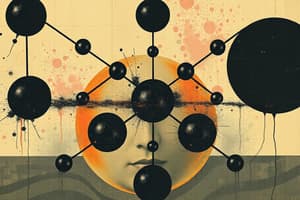Podcast
Questions and Answers
What are compounds composed of?
What are compounds composed of?
- Molecules of the same element
- Molecules of two or more different elements
- Atoms of the same element
- Atoms of two or more different elements (correct)
What are the fundamental building blocks of matter?
What are the fundamental building blocks of matter?
- Compounds
- Molecules
- Nucleus
- Atoms (correct)
Which particles make up the nucleus of an atom?
Which particles make up the nucleus of an atom?
- Neutral neutrons and negatively charged electrons
- Positively charged protons and negatively charged electrons
- Positively charged protons and neutral neutrons (correct)
- Negatively charged electrons
What is an example of a chemical compound?
What is an example of a chemical compound?
What is the difference between mixtures and compounds?
What is the difference between mixtures and compounds?
What type of bonds involve sharing of valence electrons?
What type of bonds involve sharing of valence electrons?
Which type of compounds have strong bonds and are good electricity conductors?
Which type of compounds have strong bonds and are good electricity conductors?
What is the main difference between compounds and elements?
What is the main difference between compounds and elements?
Which type of bonds involve opposite charged ions?
Which type of bonds involve opposite charged ions?
What is the main characteristic of mixtures?
What is the main characteristic of mixtures?
Flashcards are hidden until you start studying
Study Notes
Chemical Compounds and Elements
- Compounds are made of different atoms; example: carbon monoxide is made of oxygen and carbon
- Molecules are made of the same atoms; examples: oxygen gas, hydrogen gas, and nitrogen gas
- Mixtures can be separated and isolated; example: air is a mixture of various elements and compounds
- Chemical bonds hold atoms in compounds together; there are ionic and covalent bonds
- Ionic bonds involve opposite charged ions; covalent bonds involve sharing of valence electrons
- Compounds with ionic bonds are called ionic compounds; those with covalent bonds are covalent compounds
- Ionic compounds have strong bonds and are good electricity conductors; example: sodium chloride
- Covalent compounds have weak bonds and are poor electricity conductors; example: carbon dioxide
- Compounds and elements are pure substances; compounds are made of different atoms, while elements are made of the same type of atom
- Elements cannot be separated or broken down into simpler particles; compounds can be broken down into their elements
- The properties of compounds are different from their elements; example: sodium chloride is made of sodium and chlorine, which have very different properties
- Most chemical substances exist as compounds and it is difficult to find pure elements in nature
Studying That Suits You
Use AI to generate personalized quizzes and flashcards to suit your learning preferences.




